Zach Heese ’18
U-23 World Championships 2018, Senior World Championships 2019
Jonathan Furlong ’12, ’13 Grad
U-23 World Championships 2012
Matt Miller ’11
Olympic Games 2016 Rio, Senior World Championships 2015, 2014
US-Record Holder for Concept2 2,000 meter erg: 5:40.0
Wyatt Allen ’01

When Wyatt tried out for the men’s crew at UVa (a single 1000 meter ergometer piece) he “was the second-to-last guy to make the team. And it was a very distant second to last. I was pretty skinny (185 pounds) and out of shape. At least that’s my excuse.”
Wyatt quickly improved, and in just his second year of college, he was already making trips to the national team training center, in Princeton, New Jersey, to test himself on the ergometer against some of the best rowers in the United States. “I don’t remember it being intimidating as much as it was exciting and motivating. The coolest part for me was being mixed in among the best college rowers and among current national team rowers who I recognized from pictures. It was an exercise in staying focused on my own performance.”
That focus and determination eventually paid off. By his fourth year of college Wyatt had grown to 6’4″, weighed 210 pounds, and was pulling jaw-dropping numbers on the ergometer: 5:56 for 2000 meters. At the end of Wyatt’s third year of college, he and the Virginia varsity 8+ won the gold medal at the 2000 Champion International Collegiate Regatta, in Worcester, Massachusetts. That race was one of the brightest moments in the history of Virginia Men’s Rowing, and it was a prelude to much bigger accomplishments for Wyatt.
“The summer between my third and fourth year, I was invited to a selection camp for the Under-23 National Team at Cornell University. I made the men’s pair and competed in Copenhagen, Denmark, at the Under-23 World Championships, finishing fifth. It was this experience that focused me on the goal of moving to Princeton after graduation to pursue the national team.”
Wyatt not only became a national team member, he became one of its most respected and accomplished athletes. Here are some highlights of Wyatt’s national team experience.
- Seven-time senior national team member
- Gold medalist, U.S. Men’s 8+, 2004 Olympic Games, in Athens, Greece. The 8+ set a world record during its heat, rowing the 2000-meter course in 5:19.
- Bronze medalist, U.S. Men’s 8+, 2008 Olympic Games, in Beijing, China
- 2007 USRowing Male Athlete of the Year
- Winner of the 2005 Diamond Challenge Sculls (men’s single) at the Henley Royal Regatta, in England
Charlotte Hollings ’86
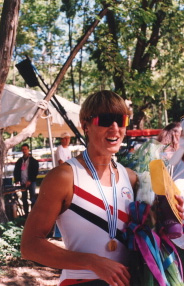
Charlotte not only rowed at Virginia and on several U.S. national teams, but she is also an accomplished coach. She has coached at T.C. Williams High School, Stanford University, Boston University, and Cornell University, and she is the former director of the Florida Rowing Center. She now runs Calm Waters Rowing, in Lancaster, VA, with her husband John Dunn. Here she describes her experience with the national team:
“I rowed in high school at T.C .Williams, in Alexandria, Virginia, where our crew was very successful. In my first year at UVa, there were only nine women on the entire team, and our coach was a second-year student who knew less about rowing than I did. We were not very successful, but we had a lot of fun!
After my second year, I started thinking about my high school success. I also wondered whether we were slow at UVa because of me or because of outside forces. I decided to find out. I spent my third year focused on trying out for the national lightweight team.
After not making it out of the rep at the Dad Vail for the third straight year, in 1985, I went off on my adventure and amazingly not only made the national team but also stroked the lightweight women’s 4, in Belgium, at the world championships. We won a silver medal. It was an all-around wonderful experience. 1985 was the first year that lightweight women’s rowing was an official event at the world championships. There were only three events: a single, a double, and a four. In fact those were the only events at the world championships in all of my years on the team.
When I returned to UVa that fall, the Cavalier Daily wrote an article about my experience that came out a few days before Halloween. It began, ‘Charlotte Hollings doesn’t look much like an athlete, not more than a twice-a-week aerobics instructor.’ Ouch! For Halloween I dressed as an aerobics instructor.
During my fourth year at UVa, our boat had a lot of success. We were fortunate to have Joe Murtaugh as our coach. We had a lot of dedicated women on the team. We beat Navy and Georgetown, won the SIRA, and made it to the finals of the Dad Vail, where we came in fourth. Not a big deal these days, but back then it was great.
I tried out again for the national team the next year, in ’86, but I sprained an ankle at camp and didn’t make it.
Russ McManus ’92
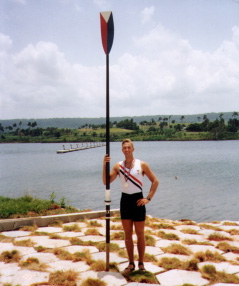
Russ rowed for the United States in the 1991 Pan Am Games, in Cuba, between his third and fourth years of college. Here he describes his time at Virginia and his summer on the national team.
“I rowed for Virginia from 1989 to 1992. I rowed in the first novice 8+ and then in the varsity 8+ for three years. Kevin Sauer was my coach all three years on varsity. Brett Wilson was the novice coach. When I started, the boathouse had a dirt floor, and we used a generator for electricity.
I learned how to be tough no matter what from Kevin. One time my hand got infected during spring training, and it swelled up to twice its normal size overnight. I went to the hospital where they drained my palm, gave me IV antibiotics, and sent me home with oral antibiotics. Kevin got me back in the boat much sooner than I thought I could. I guess I learned what was possible when you pushed yourself.
After the Dad Vail regatta in 1991, Kris Korzenowski took some of the top Dad Vail rowers out for a row on the Schuylkill. Kevin got me in one of the boats. Kris liked what he saw of me enough to invite me to the pre-elite camp in Indianapolis that summer.
I attended the camp, and was clearly among the least prepared of the athletes who showed up. Every couple of days, one or more rowers would quit from exhaustion or would be sent home by the coaches. At every practice I struggled just to finish without completely failing, but somehow I survived. Korzenowski was always yelling at me, saying I was slow at the catch.
Teo Bielefeld, who I knew from Charlottesville, helped me by saying, ‘Russ, rush the front part of the slide and bounce off the boards.’ I couldn’t believe that this was right, but it helped. The guys I was rowing with were so powerful, I had to do this to keep up. Kevin was also in Indianapolis at this time, building the course for the national championship regatta. He pushed me to keep plugging and to take things one day at a time, which helped a lot.
At the end of the camp, the coaches picked boats to go to the Pan Am trial. I was not picked for any boat. Then the Penn AC guys decided that they would form their own boats and not take part in the camp boats.
Only at this point was I asked to be in the camp eight to go to the Pan Am trial. If I wasn’t the eighth man picked for the boat, then I was the seventh. At the trial, we took an early lead on Penn AC, but started to fall apart badly in the last 250. I was sure we had lost the race, but I had misjudged where the finish line was. We won.
At this point, Curtis Jordan took over as coach, and we spent several weeks in Princeton preparing for Cuba. In the men’s eight, the race was between Cuba, USA, and Canada. The race went off around noon. Unsurprisingly, given that it was August in Cuba, the temperature was in the 90s with high humidity. We led early, but the Cubans took the lead at the 1000, easily sat on us, and won gold. We won the silver, and the Canadians won bronze.
When we got to the awards dock, there was Fidel Castro. We received our medals from him, and we stood on the dock while he gave a speech to the crowd. I barely noticed him. I was angry that we didn’t win, and I could scarcely think of anything else.
After college, I rowed for the New York Athletic Club, where I took up sculling. I had great fun, and I competed on the senior and elite level in sculling for four years.”
Joe Murtaugh ’83
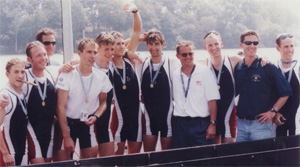
Joe Murtaugh came to the University in the fall of 1981. “I transferred from Villanova after two years. My criterion when I was looking at schools to transfer to was that the college have a good English department, and Virginia had the best one of the schools I was looking at. Plus I visited Grounds on one of those early spring days when it was dead and cold up north and green and warm and beautiful in Charlottesville. That sealed the deal.”
Joe rowed as a lightweight at Virginia, and he was coached by Stephen Schmitt, ’81, who himself rowed on many U.S. national lightweight teams. Joe stayed in Charlottesville after graduating, and pursued an M.Ed. degree at UVa’s Curry School of Education. It was during this time that he began his coaching career.
“After leaving Virginia in ’87, I coached the lightweight men at Princeton for eighteen years, also serving as the administrative coordinator for all of the Princeton rowing programs. We won lightweight national championships at Princeton in 1989, ’94, ’96, and ’98. The last three were at the IRA; the first one was in Albany, (believe it or not) where the lightweights held a national championship race from ’87-’89. We had EARC wins in ’96, ’98, ’99, and ’03. I still get out on the water. My former colleagues let me watch the occasional Princeton practice, and I announce their home races in the spring.
During the summers of 1997-2001, I was an assistant to head U.S. men’s coach Mike Teti at the Princeton Training Center. I mainly coached the men’s lightweight eight in preparation for the senior world championships. From ’97-’99 I co-coached that boat with Andy Card, the lightweight coach at Yale, and in 2001 with Greg Hughes, the current lightweight coach at Princeton. We won four medals: gold in 1999 in St. Catharines, Ontario, and again in 2000 in Zagreb, Croatia; silver (losing by a foot) in Cologne, Germany, in 1998; and bronze in Lucerne, Switzerland, in 2001.
Coaching at the Princeton Training Center was different from coaching my college teams, where pesky distractions like having to study tend to get in the way of athletic goals. I worked with some of the best athletes and coaches in the country (the kind of environment that makes any coach look good). The best athletes are usually behind the best results on the water, regardless of the level of competition, and any coach who doesn’t realize that is kidding himself.
I thought the trickiest part of the task, with so much available talent, was getting the right people in the boat, because in most years there were more than just nine suitable choices. That was a nice problem to have, and it was key to the results we were able to achieve.
My national team coaching memories revolve around how much I felt it was a privilege to coach a team that was representing our country in international competition. I never thought I’d be able to have that chance, and I’m grateful for it.”
Kristin Reed ’95
Grace Mowery Royalty ’93
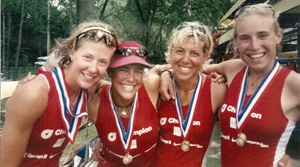
Grace rowed for just two years at Virginia, from the fall of 1991 through the spring of ’93. In her first year, Grace rowed in first novice eight, under coach Kitty Coe, and then in the varsity eight in her second year, under coach John Preston. After graduating from Virginia, Grace moved to Philadelphia, where she continued rowing, for the Philadelphia Girls Rowing Club. She continued rowing and training while she coached the novice women at Drexel University for one year.
Grace’s ergometer scores continued to improve as she trained in Philadelphia, so much so that she caught the attention of the head coach of the U.S. women’s national team, Hartmut Buschbacher, who asked Grace to travel to the Olympic Training Center, in Chula Vista, California, to try out for the national team. She was selected for the lightweight women’s quad that summer and soon jetted off to the 1997 world championships, in Aiguebelette, France, as the stroke of the quad. Two summers later, at the Pan American Games, in Winnipeg, Canada, she rowed 2 seat in the lightweight quad that took home the silver medal.
“I wasn’t scared of living and training at the Olympic Training Center. It was my dream to be on the national team. The workouts were hard and really long. We literally spent our days working out and recovering from working out. It was a truly abnormal existence. I absolutely loved it, but it was probably not the best environment for someone like me who knows no moderation when it comes to training. My VO2 and capacity for volume really jumped after the first summer there. The OTC and the USOC are amazing in terms of the resources that are available to the athletes. I really liked being around the athletes from the other sports too.”
Oh, and did we mention that Grace’s world championship adventure took place in the summer between her second and third years of law school? “I trained and lived at the OTC during the summers and then lived there for a year after law school,” she writes. “Yes, I had a law degree, and I was living in a dorm room with three other girls. I left there in 1999 to take the bar exam and get a real job.”
After leaving the national team, Grace twice rowed in the Head of the Charles, in 1997 and 1998, in the women’s lightweight eight. In both years her boat did what few crews manage to do at that race: they won the event.
“It has pretty much been downhill since then. I rowed about once a week this summer and realized why not all people love rowing (something I could never understand before): it’s really hard! I wish I had taken some pictures of me pregnant and rowing. I stopped at about eight months, when I couldn’t move my footstretchers any further back in the boat to keep from hitting my belly. A pregnant woman in a unisuit. Hah!”
These days, Grace is an attorney in Cincinnati, Ohio, where she lives with her husband Tim, who runs Precision Racing, a company that builds racecourses for rowing, canoeing, kayaking, and open-water swimming. Their older son Preston is named in memory of former Virginia oarsman and coach John Preston. Their infant son is named Emmett.
Norton Schlacter ’72
Norton’s bio is coming soon.
Steve Schmitt ’81
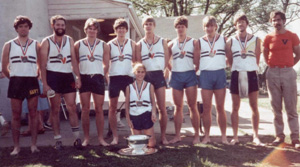
Steve rowed at the University from 1977 to 1981. He became the men’s novice coach after graduating, and was the head coach in ’82. “Those were pretty bleak years as far as participation goes,” he writes. “In ’82, all we had was a lightweight 8, a heavyweight 4, a JV 8, and a women’s 4. Joe Murtaugh kept the program going and grew it in the years after I left.”Before Steve came to the University, he had rowed for four years at Washington & Lee High School, in Arlington, Virginia, and he had already competed on the U.S. junior national team. “In order to qualify for the junior world championships (no races were designated as heavyweight or lightweight) we raced at a trial in Princeton. Our main rival was a composite boat made up of much bigger New England prep-school guys. As we carried our Donoratico eight, which was literally held together with C clamps, to the dock, the prep guys heckled us from the boathouse locker room. It was a great race that we won by about half a length.”
In 1979, Steve made the senior national team, in the lightweight 8, which was coached by Mike Vespoli. “The lightweight camp was held at Princeton. The first day was all erg testing on the old Gamut ergs. I have to admit that a great erg score on my part helped me get noticed. A couple of the assistant coaches started looking under and around the erg while I was doing the piece, thinking that something must have broken free for me to be doing so well. The erg test in those days was a six-minute piece with 4.5 lbs of weight in the brake basket. The score was the total revolutions of the flywheel. As I recall, a score of 3,600 was considered very good. I pulled more than 3,800.
“Following the erg testing, there was about a week of seat racing. After the top sixteen or so had been selected from the original pool of approximately seventy-five guys, the camp moved to New Haven, Connecticut. We trained at Yale for several weeks. The camp then moved to Hanover, New Hampshire for the remainder of training.
“Mike Vespoli was an excellent coach. He later stopped coaching to devote himself to his budding boat business (it was originally called CarboCraft when he bought into the business). I vividly remember one of the first days at camp when Mike got the whole team together and made it clear that he would run the camp as a ‘democratic dictatorship.’ We were free to voice our concerns and opinions, but we would do as he said. And sure enough it was run that way.
“The world championships were held in Bled, Yugoslavia, an absolutely beautiful, fair racecourse. We won the silver medal that year, losing by just 18/100th of a second.”
In 1980, Steve again made the national team’s lightweight 8. “The world championships were held in Hazewinkel, Belgium. Most of the training was done in Ithaca, New York, out of Cornell’s boathouse. In the finals, we were in solid second with 500 to go, but faded badly and ended up fourth.
“One vivid memory from Ithica was Mack Good, a guy who rowed out of the New York Athletic Club. He ‘fished’ off the dock in the evenings with M-80s (a powerful firecracker). He’d pitch in a couple, wait for the explosion, and scoop the dead fish out to fry up for dinner.”
In 1985, Steve returned to international rowing because there was talk of adding lightweights to the 1988 Olympics, though that didn’t happen until 1996. “But it got me back into shape! The lightweight national team 8 was coached by Kris Korzeniowski, who had just taken over as the national team head coach, for both the heavyweights and lightweights. The worlds were again held at Hazewinkel, Belgium, and we spent most of our time training in Ithaca.
“The highlight of the camp was racing at the Royal Canadian Henley Regatta. There was a special 8 event for national teams, which we won, beating our heavyweight 8 in a strong tail wind and rough water. We rowed extremely smoothly, which the heavies were not able to do. The tail wind was a great equalizer.
“At the worlds, we were 4th at the 500 to go and moved strongly into 2nd by the finish. We ran out of race course. Silver medal.”
Steve made the national team again in 1986. “The world championships were held in Nottingham, England. This was the worst racecourse I have ever seen. Some days the course was closed due to dangerous conditions. You could stand at the finish line, look up the course, and see a circular current due to the wind. Lanes 1, 2, and 3 would be rowing into a current, while 4, 5, and 6 would have the current with them. Sure enough, every race that day was won by boats in lanes 4, 5, or 6.
“The highlight of 1986 came before the camp started, when Charlie Butt, myself, Michael Scott, and Pete Kermond (two of the guys from the ’85 boat) got together to row a straight four at the Royal Henley Regatta, in England.There we won the Wyfold Challenge Cup.
“In 1987 The Henley four got back together and trained in Washington, D.C. and in Boston. We easily won the trials to compete at the world championships in Copenhagen, Denmark. We didn’t make the finals at the worlds, but we did win the petites.”
Steve still rows a single. He is a member of the Potomac Boat Club, in Washington, D.C., “and I compete in the fall head races. I won the 40-49 division at the Head of the Potomac this year. I may race this summer at the USRowing Masters National Championships.”

